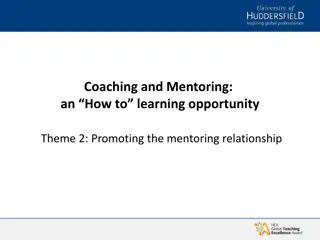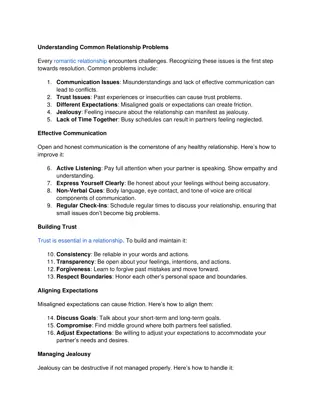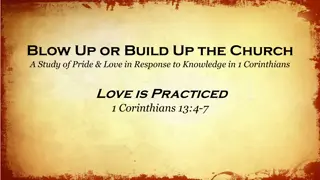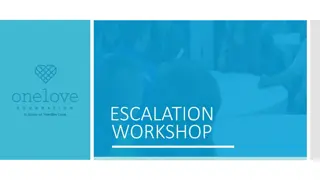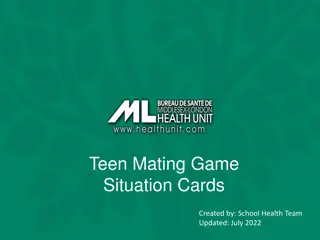Insights on Love Skills and Relationship Dynamics
Explore the complexities of romantic love, predictors of divorce, and essential skills for maintaining a healthy relationship. Dive into topics such as passion, communication, and the importance of cooperation in fostering lasting love. Gain valuable insights from experts like John and Rita Sommers-Flanagan as you navigate the intricacies of love and connection.
Uploaded on Sep 10, 2024 | 0 Views
Download Presentation

Please find below an Image/Link to download the presentation.
The content on the website is provided AS IS for your information and personal use only. It may not be sold, licensed, or shared on other websites without obtaining consent from the author. Download presentation by click this link. If you encounter any issues during the download, it is possible that the publisher has removed the file from their server.
E N D
Presentation Transcript
Love Skills . . . with John and Rita Sommers-Flanagan
The Orange Street Bridge 36+ years later
Broadly: To discuss how it might be easier to fall in love than it is to stay in love, which is why learning a few love skills is a good idea Define (sort of) romantic love Identify 6 predictors of divorce (J. Gottman) Describe 6 skills for fending off the predictors of divorce (J. Gottman, S. Johnson, and the Jungians)
Engagement and Participation Openness to Learning Commitment to Respect for Different Perspectives
In honor of Dr. Nichols s 2021 syllabus and song quotations, we offer this one. The book of love is long and boring, and written very long ago. Stephin Merritt (Peter Gabriel)
Passion/Eros Compassion Commitment Communication Investment And your experiences?
Males found female confederates more attractive and were more likely to call them when they met them on a suspension bridge.
Love often starts with physical and emotional passion . . . Although the physical and emotional passion is fun and enhances relational bonding, love requires more.
When partners attack each other with harsh opening statements, less good things happen What s a soft start-up? I like it when you . . . How can we . . . What do you think would . . . What would Adler say?
An incalculable amount of tension and useless effort would be spared in this world if we realized that cooperation and love can never be won by force. (A. Adler, 1931, p. 132). Adler is a fan of the soft start-up.
Criticism More global than a specific complaint (Why are you so forgetful? Why don t you care about my feelings?). Contempt Roll your eyes and curl your lip in disgust . . . And see how that works out. Defensiveness Victimizing yourself to reverse blame. This involves NOT listening, and defending yourself or counter-attacking. Stonewalling Shutting down, turning away, walking out.
Criticism: Complain about specific behaviors with I statements tied to emotional bids: I like it when you . . . I feel when ___, because ____. Contempt: Deal with small things before they deepen and bitterness grows. Culture of appreciation. Gratitude for positive actions.
Defensiveness: Listen first. Take responsibility. Accept partner s perspective. Remember, your partner is on your team Stonewalling: Physiological self-soothing. If you need a break, call time-out; later you can return for a constructive discussion
When applied to love and marriage, it is to pay greater attention to the other person than to oneself, to live so as to make life for one's partner easier and more pleasant.
Flooding happens when your partners negativity becomes overwhelming. You may feel desperate. You may feel very bad about yourself. You may feel the urge to strike back below the belt. Solutions: Hit pause; self-soothe; visualize your partner at his/her/their best
Turning away and fleeing the scene feels natural and protective. (100 beats/minute; no longer rational) You ll need structure, tools, and support to face a situation that has held chronic criticism and flooding. Counseling may be especially helpful.
When you try and fail (even through silliness) to manage conflict and negativity, then you end up feeling discouraged. (Who wants to hug?) Shifting thinking is important; don t just turn up the volume, change the channel or modality of communication; you will need small successes to gain traction. Forgiveness. https://www.gottman.com/blog/r-is-for-repair/
There are too many people in our society who take and have great expectations, and too few who give. It seems that too much of human kind is caught in a love and marriage formula that states: Because I love you, you must obey me!
When there has been chronic negativity, couples often re-write the past. Early courtship questions (aka the romantic history). Mutual savoring from positive psych (do now) Mutually enjoyable time and activities are essential to shift the mood and remember the positive. Create them!
Although rekindling passion is great, more important is for couples to engage in behaviors that strengthen friendship. Ask: How would I (should I) treat my best friend in this situation?
Each partner must be more interested in the other than in himself. This is the only basis on which love and marriage can be successful. (Ansbacher& Ansbacher, 1956, p. 432)
What did you find interesting about this presentation? What would you like to remember??
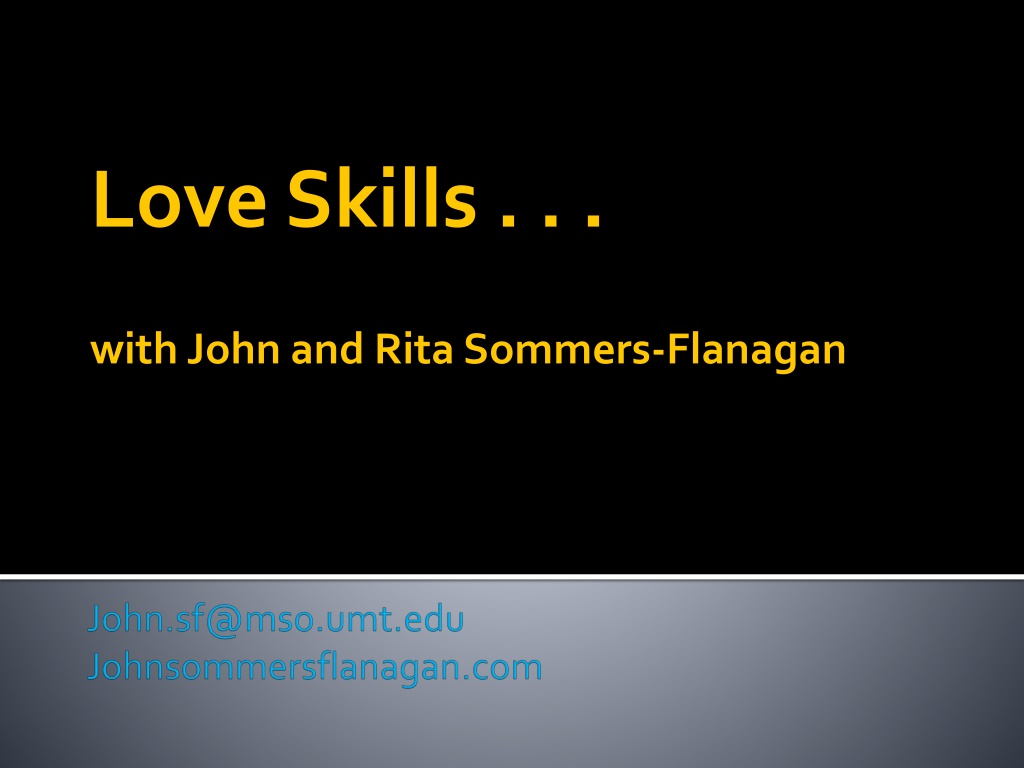
 undefined
undefined




